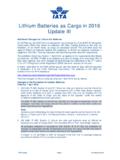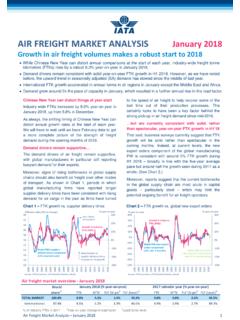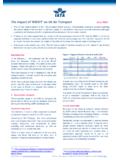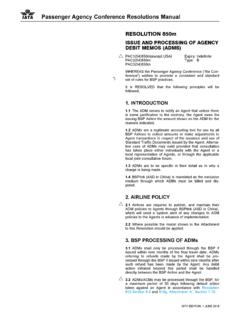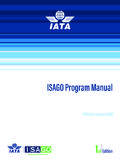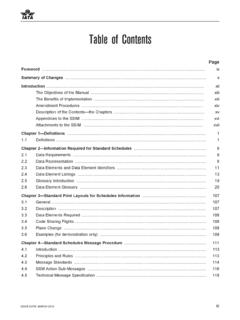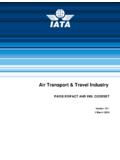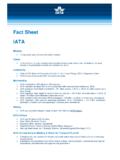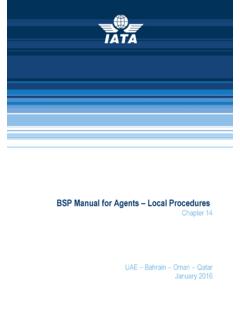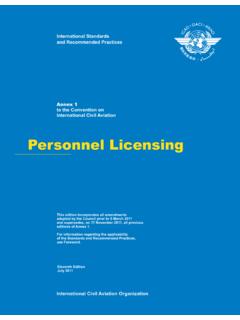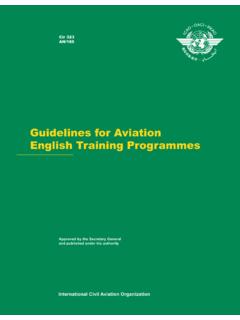Transcription of Pre-operational Level 3 - International Air Transport ...
1 icao language proficiency requirements Source: Manual on the Implementation of icao language proficiency requirements 2nd edition To help you in your English language assessment and training, IATA offers the following courses: Aviation English language Solution assessment Developed in partnership with Berlitz Languages, Inc., this comprehensive assessment service lets you easily determine your icao Aviation English proficiency Level and select the right training program to bring you up to Level 4 proficiency Aviation English language Solution - Training Developed in partnership with Berlitz Languages, Inc., this complete language training solution provides interactive instruction to ensure your icao -set Aviation English requirements and that you can communicate effectively on the job.
2 Contact Us for information on how to organize this training for your company Pre-operational Level 3 Pronunciation Structure Vocabulary Fluency Pronunciation, stress, rhythm and intonation are influenced by the first language or regional variation and frequently interfere with ease of understanding. Accent at this Pre-operational Level 3 is so strong as to render comprehension by an International community of aeronautical radiotelephony users very difficult or impossible. It should be noted that native or second language speakers may be assessed at this Level in cases where a regional variety of the language has not been sufficiently attenuated. Basic grammatical structures and sentence patterns associated with predictable situations are not always well controlled. Errors frequently interfere with meaning.
3 A weak command of basic grammatical structures at this Level will limit available range of expression or result in errors which could lead to misunderstandings. Vocabulary range and accuracy are often sufficient to communicate on common, concrete or work-related topics, but range is limited and the word choice often inappropriate. Is often unable to paraphrase successfully when lacking vocabulary. Gaps in vocabulary knowledge and/or choice of wrong or non-existent words are apparent at this Level . This has a negative impact on fluency or results in errors which could lead to misunderstandings. The frequent inability to paraphrase unknown words or in the process of clarification makes accurate communication impossible. Produces stretches of language , but phrasing and pausing are often inappropriate.
4 Hesitations or slowness in language processing may prevent effective communication. Fillers are sometimes distracting. The slowness of speech flow at this Level is such that communication lacks concision and efficiency. Long silent pauses frequently interrupt the speech flow. Speakers at this Level will fail to obtain the professional confidence of their interlocutors. icao language proficiency requirements Source: Manual on the Implementation of icao language proficiency requirements 2nd edition operational Level 4 Pronunciation Structure Vocabulary Fluency Pronunciation, stress, rhythm and intonation are influenced by the first language or regional variation, but only sometimes interfere with ease of understanding. operational Level 4 speakers demonstrate a marked accent, or localized regional variety of English.
5 Occasionally, a proficient listener may have to pay close attention to understand or may have to clarify something from time to time. operational Level 4 is certainly not a perfect Level of proficiency ; it is the minimum Level of proficiency determined to be safe for air traffic control communications. While it is not an Expert Level , it is important to keep in mind that pronunciation plays the critical role in aiding comprehension between two non-native speakers of English. Basic grammatical structures and sentence patterns are used creatively and are usually well controlled. Errors may occur, particularly in unusual or unexpected circumstances, but rarely interfere with meaning. operational Level 4 speakers have good command of basic grammatical structures. They do not merely have a memorized set of words or phrases on which they rely but have sufficient command of basic grammar to create new meaning as appropriate.
6 They demonstrate local errors and infrequent global errors and communication is effective overall. Level 4 speakers will not usually attempt complex structures, and when they do, quite a lot of errors would be expected resulting in less effective communication. Vocabulary range and accuracy are usually sufficient to communicate effectively on common, concrete and work related topics. Can often paraphrase successfully when lacking vocabulary in unusual or unexpected circumstances. An operational Level 4 speaker will likely not have a well-developed sensitivity to register (see glossary on page (ix)). A speaker at this Level will usually be able to manage communication on work-related topics, but may sometimes need clarification. When faced with a communication breakdown, an operational Level 4 speaker can paraphrase and negotiate meaning so that the message is understood.
7 The ability to paraphrase includes appropriate choices of simple vocabulary and considerate use of speech rate and pronunciation. Produces stretches of language at an appropriate tempo. There may be occasional loss of fluency on transition from rehearsed or formulaic speech to spontaneous interaction, but this does not prevent effective communication. Can make limited use of discourse markers or connectors. Fillers are not distracting. Speech rate at this Level may be slowed by the requirements of language processing, but remains fairly constant and does not negatively affect the speaker s involvement in communication. The speaker has the possibility of speaking a little faster than the icao recommended rate of 100 words per minute if the situation requires (Annex 10, Volume II, b). icao language proficiency requirements Source: Manual on the Implementation of icao language proficiency requirements 2nd edition Extended Level 5 Pronunciation Structure Vocabulary Fluency Pronunciation, stress, rhythm and intonation, though influenced by the first language or regional variation, rarely interfere with ease of understanding.
8 Extended Level 5 speakers demonstrate a marked accent, or localized regional variety of English, but one which rarely interferes with how easily understood their speech is. They are always clear and understandable, although, only occasionally, a proficient listener may have to pay close attention. Basic grammatical structures and sentence patterns are consistently well controlled. Complex structures are attempted but with errors which sometimes interferes with meaning. Extended Level 5 speakers demonstrate greater control of complex grammatical structures than do operational Level 4 speakers and may commit global errors from time to time when using complex structures. The critical difference between the Level 4 and Level 5 requirements concerns the use of basic grammatical structures and sentence patterns compared to the use of complex structures (see the glossary of basic and complex structures in Appendix B, Part IV).
9 At Level 5, the structure descriptors refer to consistent control of basic structure, with errors possibly occurring when complex structures and language are used. There is actually a big jump between Level 4 and Level 5. Level 5 speakers will have a more sophisticated use of English overall, but will exhibit some errors in their use of complex language structures, but not in their basic structure patterns. Vocabulary range and accuracy are sufficient to communicate effectively on common, concrete and work-related topics. Paraphrases consistently and successfully. Vocabulary is sometimes idiomatic. Extended Level 5 speakers may display some sensitivity to register, with a lexical range which may not be sufficient to communicate effectively in as broad a range of topics as an Expert Level 6 speaker, but a speaker with Extended proficiency will have no trouble paraphrasing whenever necessary.
10 Able to speak at length with relative ease on familiar topics but may not vary speech flow as a stylistic device. Can make use of appropriate discourse markers or connectors. Rate of speech and organization of discourse at this Level approach natural fluency. Under appropriate circumstances, rates significantly higher than the icao recommended rate of 100 words per minute can be achieved without negatively affecting intelligibility. icao language proficiency requirements Source: Manual on the Implementation of icao language proficiency requirements 2nd edition Expert 6 Pronunciation Structure Vocabulary Fluency Pronunciation, stress, rhythm and intonation, though possibly influenced by the first language or regional variation, almost never interfere with ease of understanding. An Expert Level 6 speaker may be a speaker of English as a first language with a widely understood dialect or may be a very proficient second- language speaker, again with a widely used or understood accent and/or dialect.
